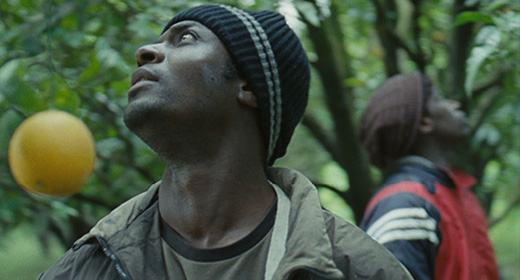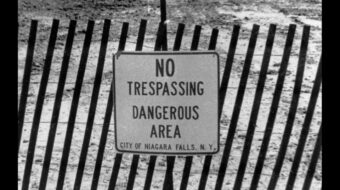
Jonas Carpignano’s Mediterranea is a powerful look at the plight of mostly undocumented migrants from Africa to Europe. This feature follows Burkina Faso native Ayiva Seihon (Koudous Seihon) and a group of other African migrants from French- and English-speaking sub-Saharan nations as they embark on the long, grueling trek to Europe from Algeria and then Libya. The unsparing fiction film shows that along the way this ragtag group must confront the harsh elements in the desert; bandits; rip-off coyotes; and a storm at sea, as they set sail for Europe.
Instead of finding a “promised land” upon their arrival in Italy, the Africans must somehow make their way in a mostly unwelcoming world. Minus working papers, they must find work, which is difficult, hard labor, including, like the California-bound Oklahomans the Joads in John Steinbeck’s Depression-era classic The Grapes of Wrath, as fruit pickers. The newcomers live in Hooverville-type shantytowns and must deal with hostile Italian mobs, as well as the police. (By the way, Steinbeck’s other novel about class struggle in the fields, featuring a Communist-led strike, In Dubious Battle, has been adapted for the screen by actor/director James Franco and will be released in 2016.)
Mediterranea‘smost powerful scene is a riot, where after two of them have been shot and killed the Africans rampage through the Italian town they’ve been subsisting in, burning cars and looting. Their harrowing slogan is, alas, all too familiar to African Americans: “Stop shooting Blacks!” (which they for some reason chant in English). One couldn’t help but think of the Ferguson slogan: “Hands up! Don’t shoot!”
But what’s not familiar to American viewers is exactly why these migrants are making the perilous journey from Burkina Faso and other African lands to scrape by in Europe? Mediterranea, which is an expansion of Carpignano’s 2012 award winning short A Chjana, also starring Koudous Seihon, is the New York-born director’s feature debut. Although one can assume that the Africans are seeking “better” lives with higher paying jobs than are available back home, the movie fails to make their motivations clear.
Mediterranea is not out-of-date per se – but it is definitely not up-to-date. Europe is beset now by the world’s largest refugee crisis since World War II, a disaster of epic humanitarian proportions. I just heard on FOX News that 60 million people around the world are currently “displaced.” But like those Central Americans attempting to enter the USA in 2015, they are mostly not economic migrants per se. Rather they are fleeing war and massive violence rendering nations such as Syria, Libya, Afghanistan, Guatemala, etc., unsafe to live in at any speed for masses of besieged, beleaguered people.
Mediterranea was also made before the current round of civil unrest in Burkina Faso, but writer/director Carpignano’s failure to show what people are running away from and why is a grievous omission that may be an inexperienced first timer’s mistake. Theatergoers aren’t mind readers and I seriously wonder how many Americans could even find Burkina Faso on a map.
(By the way, this current flood of humanity desperately crossing borders in search of safety, et al, is largely the result of imperialist invasions and interventions in countries such as Iraq and Libya. We can thank the war hawks of recent administrations for this devastating blowback, as well as Reagan’s despicable Contra war of the 1980s. We should also recall those many Jews and others who tried to escape Nazism as we grapple with this tidal wave of suffering people.)
Mediterranea also doesn’t explain why Italians roust the immigrants. Competition for rare resources? Vying for low-paying jobs? The petty theft newcomers such as Ayiva perpetrate in order to survive under harsh conditions? Maybe the Italian males want access to African prostitutes but don’t want Blacks dancing with Italian women at a disco? Mediterranean nations such as Italy, Spain and Greece that are on the frontlines of receiving the “brunt” of the economic migrant surge may have higher standards of living than, say, Burkina Faso, but they aren’t paradises either, with high unemployment rates, national debts, and other problems facing their citizens.
It’s not simply a matter of racism because there are several Italian characters who aren’t racist and even express sympathy for the immigrants, including one nicknamed “Momma Africa.” Are she and another young European women who help the migrants acting out of religious sentiments or political convictions? Inquiring minds want to know – but apparently Carpignano expects his viewers to be clairvoyants.
Who knows why Mediterranea‘scharacters are putting themselves at such risk to themselves – Carpignano doesn’t bother to explain.
Nevertheless, alternating between docudrama and artsy styles, it is well acted and worth seeing for those interested in racism and the situation of Blacks in general and particularly of sub-Saharan Africa’s, and to a lesser extent North Africa’s, economic migrants. Despite its shortfalls Mediterranea succeeds in putting the stateless, the homeless, the wretched of the Earth in the limelight they deserve.

MOST POPULAR TODAY

Ohio: Franklin County treasurer attends Netanyahu meeting, steps up Israel Bond purchases

After months of denial, U.S. admits to running Ukraine biolabs

“Trail of Tears Walk” commemorates Native Americans’ forced removal

‘Warning! This product supports genocide’: Michigan group aims to educate consumers

Hold the communism, please: SFMOMA’s Diego Rivera exhibit downplays artist’s radical politics






Comments